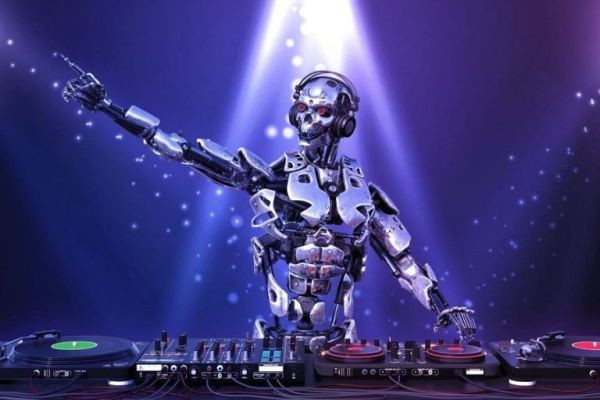You're in a club where the lights are flashing and the music is banging.
Due to the AI-generated mix, there is no one in the DJ booth when you glance up.
Some people in the dance music industry are concerned about the advancement of mixing software and the budget cuts made by venues.
Can a computer programme ever take the role of a DJ and a crowd's in-person interaction, though?
Simply put, no. Not in Nooriyah's opinion, at least.
She is a London-based DJ who is 28 years old. She performs at places all around the world, occasionally for crowds of over 40,000 people.
Since many years ago, her industry has had AI software that suggest songs to mix according on their tempos.
But Nooriyah hasn't lost her job yet, and she believes she understands why.
"Because the way that I connect with my audiences is very difficult to replicate," she explains.
"Picture a raver watching me perform and noticing that I dance and perspire just like them.
They experience an intimate connection at that precise instant that AI was unable to.
During lockdown, Hannah Rose picked up DJing, and she's striving to make it her main source of income.
Although she has a lot of work, she has noticed that venues are reducing their budgets as the cost of living problem worsens.
She claims that there has been a significant movement towards people requesting to stream sets ever after Covid.
"It's an easy and accessible way to get the artists on their line-ups without actually having to have them in the room, especially when it's somewhere overseas if they don't have the money to get you to play in a different country."
Hannah has observed that many nightclubs have a camera set up for broadcasting from behind the DJ booth.
Now she is concerned that will include virtual sets.
As she puts it, "They still have a long way to go before they can match the emotional intelligence of a human, but with AI generating original compositions, it could be quite a bleak future for DJs."
Some people complained that the music felt "dry and empty" at an AI rave that was held in East London in March of this year, to mixed reviews. Although it's possible that people make the finest DJs, the situation is more complicated for producers.
Nooriyah not only DJs but also produces her own music.
Her current creative method entails trying out various sounds in software before mastering tracks. In this last level, AI plays a role.
She asserts that the discourse concerning AI in production is long overdue.
At least ten distinct software programmes already exist that can mix music and potentially replace producers.
She desires improved communication between individuals working in the music industry and AI developers.
The risk, in my opinion, is that work is being done without consideration of what it might entail for the music business.
She suggests taxing the AI businesses as a potential solution.
"First, let's tax the developers of these AI programmes and slow down their release, using the proceeds to fund training for those who will lose their jobs to AI."
Philip Kear concurs. He is concerned that AI will limit how much consumers are prepared to pay for recordings generated by human producers because he works with the Music Union.
"AI music will be less expensive," he claims. "And I believe that users, possibly bars, will be tempted to use it.
Although, in his opinion, it can only have its full power if people let it to.
"A lot will depend on whether or not the public accepts AI or the calibre of the music it can produce."Although he believes that most commercial music won't be affected, he singles out "background" music as being particularly vulnerable.
He claims that because AI-generated music lacks a personality, "the public will be much more willing to accept it with music on TV and films."
"In contrast, I believe there is a certain amount of investment in bars and clubs."
The music industry, like many others, has already been impacted by technological advancements.
This development is the same for Nooriyah.
"Music has changed a lot throughout the years. There was a disturbance as we transitioned from tapes to CDs, radio to streaming services, and everything in between. This is the same as before.
We simply need to reevaluate, regain our bearings, and govern events so that it becomes a thrilling collaborator rather than an adversary.









